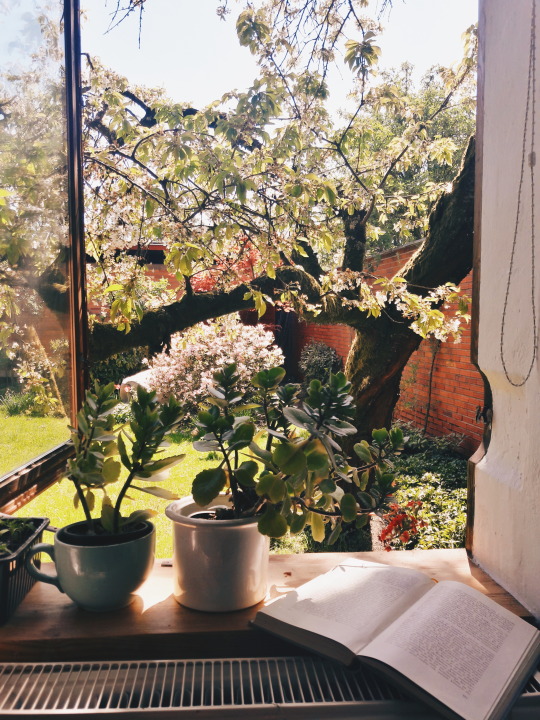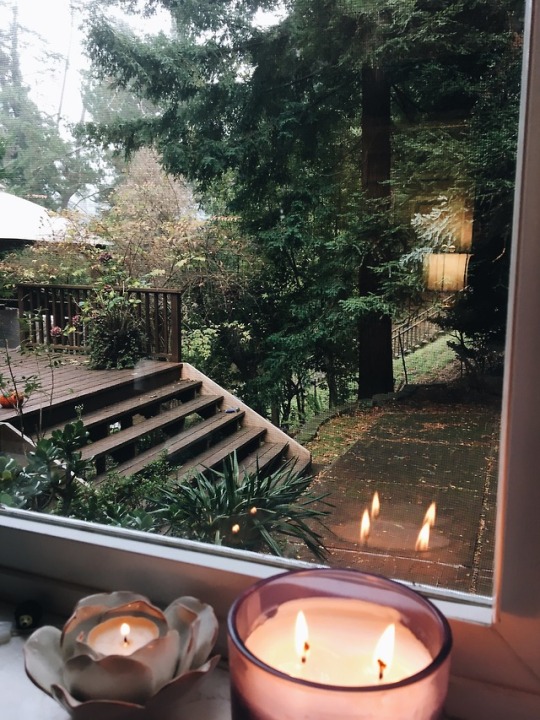• 21 years old • 4th year criminal law student • Paris • I speak English, French and Spanish, currently learning Russian
Don't wanna be here? Send us removal request.
Text
Studying from home, a new lifestyle during #Covid19 plague
Every library is closed, so are universities and you may be desperate because the library was the only place where you were able to focus.. I totally get you! But as someone who’ve spent most of its school years studying at home.. I can assure you that it’s totally fine! You just need a few techniques and organization skills and you’ll see that everything will be ok ! So here we go :
Clean and declutter your study space. Store the books you don’t need anymore and only keep the essentials on your desk. I’ll share with you an old article I wrote on Tumblr about how to upgrade your workspace!
Block distractions : give your phone to your mom, use the Forest app, the Flipd app or just put it in airplane mode !
Cut the outside noise : a good playlist (my Lofi playlist for example :P), earplugs and the door shut can help you be in the « library » mood…
Make a study plan and try to stick to a routine.. It’s easy to lose track of time when you spend all of your days at home! This is why keeping a healthy routine and set hours for meals and breaks is really important!
Since it’s easier to get distracted at home, make sure to take more breaks than the usual (for example a 45min study session and a 10 min break).
If you have online lectures and a #studybuddy that you trust, why not split the work (for example you follow half of the lectures and your colleague the other half) and then sharing your notes? Also, why not creating a Google Drive with your colleagues so everyone shares their notes? The quarantine will be long so a little support from each other is more than welcomed!!
You can also have skype sessions with your colleagues to debate about a subject, or quiz each other so you don’t feel too alone and you keep track of your progress :)
You can also take the time to go deeper into the subjects you have to study and not only scratching the surface like you may be used to do ! This is also a great way to discover if you’re more interested in some subjects than others and who knows, maybe you’ll find a new passion !
If you feel like you can’t focus anymore then.. stop. It’s totally fine to not being able to study all day, especially when you have nothing else to do and when the deadlines are still far and unsure. So Take this time to enjoy your family, work on yourself, read a book, or start a new hobby.
Studygram
3K notes
·
View notes
Photo
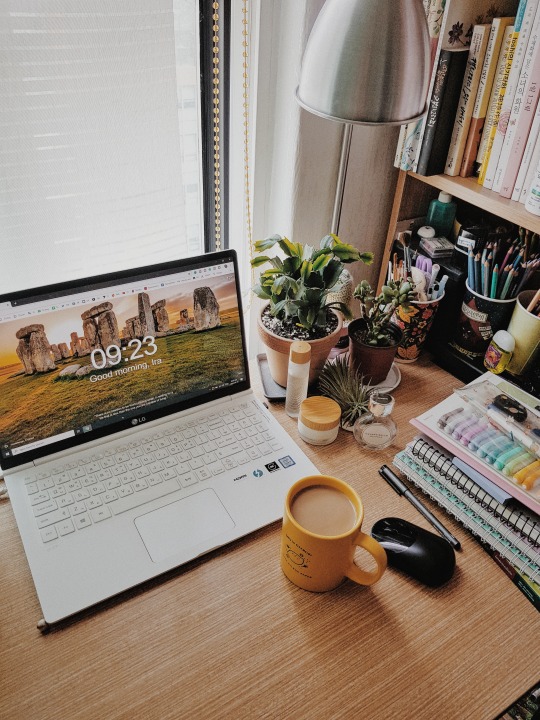
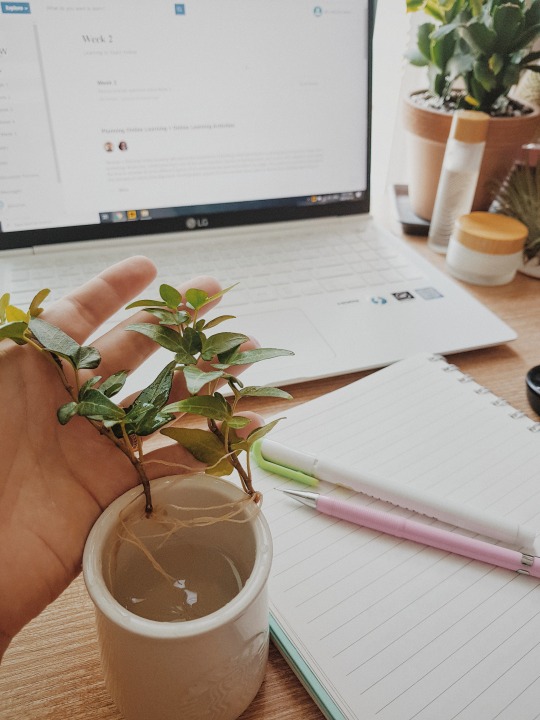
2020.04.16
Did not sleep well and barely managed to wake up at a decent hour after snoozing all the alarms. Woke up with a headache, but it’s gone now. I always get affected by the weather and it’s so gloomy today… Checked how my ivy babies are doing (we are growing roots!). Surrounding my desk with plants was the best idea ever! Picked a green highlighter for this morning studying session. Let’s start the day!
7K notes
·
View notes
Photo

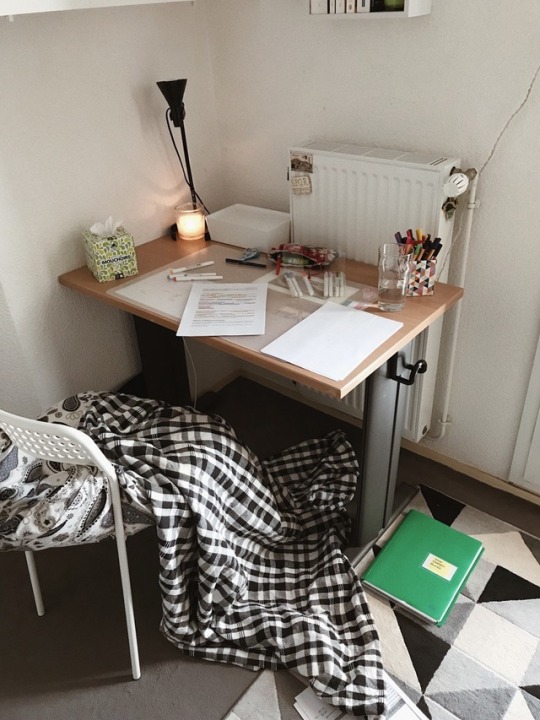
(Messy) desk situation: trying to stay hot and cozy while studying for finals
14K notes
·
View notes
Photo


(Messy) desk situation: trying to stay hot and cozy while studying for finals
14K notes
·
View notes
Photo


this is how i spent all of autumn break. in my dads mock-studio which is just a bright room in our summer house (honestly the light in there is magical). studying economics until my eyes bled.
24K notes
·
View notes
Photo
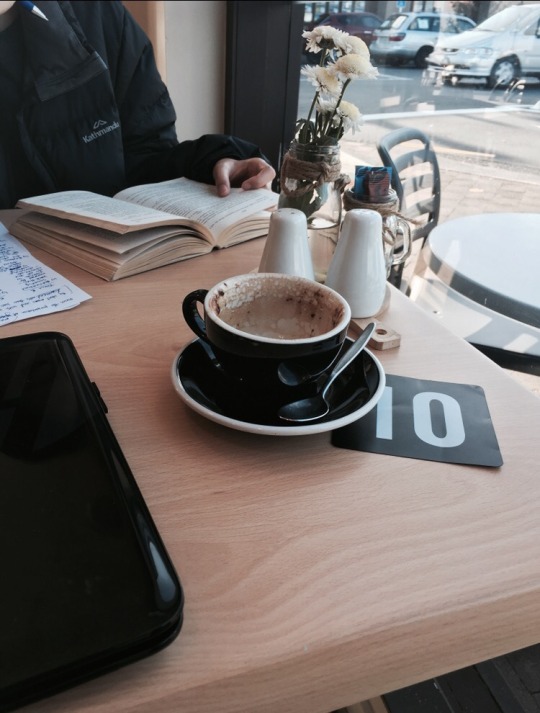
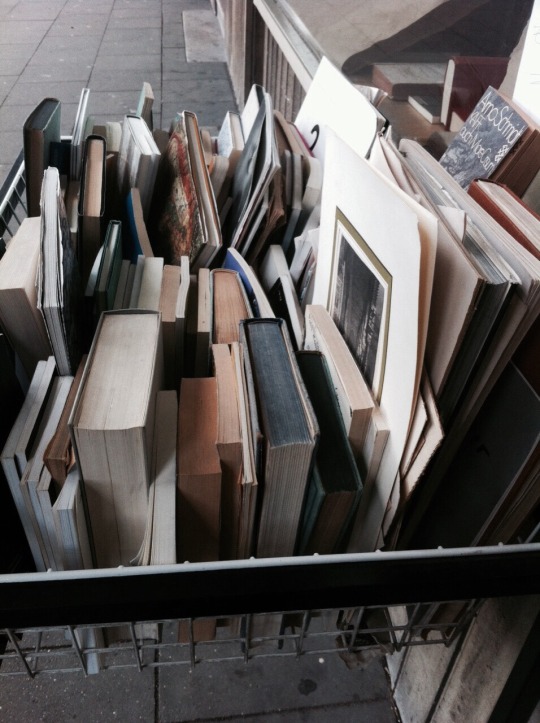
studying made better with coffee, almond croissants and good company
48K notes
·
View notes
Text
Language learning timetable
Hi everyone, I’m back with a language learning timetable (sort of)! It’s the updated version of the one I made for Russian. I hope it helps you organize your studies 😊
Choose between 1 / 2 / 3 hours daily, you can alternate and study 1h on weekdays and 2-3h over the weekend, for example.
Grammar. 30 minutes / 1 hour / 1 hour.
Review old rules and learn new ones
Take notes of grammar rules and verb conjugations in notebook1
Solve textbook exercises in notebook2
Vocabulary. 16 minutes / 30 minutes / 30 minutes.
Review old words and learn new ones
Write down vocabulary lists on notebook1
Add word sets to Memrise, Anki or Quizlet with mixed topics
Reading. 4 minutes / 8 minutes / 30 minutes.
Read children’s or graded books, news, articles
Write down unknown words with their meaning in notebook1
Listening. 3 minutes / 7 minutes / 30 minutes.
Listen to audiobooks while reading
Listen to music while reading the lyrics
Watch cartoons, shows or youtube videos
Speaking. 3 minutes / 7 minutes / 15 minutes.
Speak about the last topic you learned
Writing. 4 minutes / 8 minutes / 15 minutes.
Write about the last topic you learned in notebook2
Write summaries of cartoons, shows or books in notebook2
Write short stories
Write a paragraph in your diary
This is the image I used as reference:

118 notes
·
View notes
Photo

I’ve just rewritten my notes on sequences, a fascinating topic of Mathematical Analysis 1!
4K notes
·
View notes
Photo


Drinking black coffee and studying John Milton’s Paradise Lost for my Explorations exam in May. This Satan character seems pretty cool.
10K notes
·
View notes
Photo

aug.12 | I tried to be productive by rewriting a bit of my pathology lecture this morning :D
796 notes
·
View notes
Photo


2020.04.29
Finally managed to wake up at a decent time again and study. Have finished Basic Spanish 2 and wanted to move onto Basic Spanish 3, but from the first glance it looks like I’m expected to know more than I actually do *sweating emoji*, so I am considering going over the things I’ve learned with my Spanish textbook first and then come back to the course.
I use mechanic pencil to write my notes, so it’s impossible to take a legible photo of them. Should I switch to a black ball pen instead?
106 notes
·
View notes
Text


doing physics lab online is not the move but this whipped coffee 100% is 🤩
4K notes
·
View notes
Text
How to learn a language when you don’t know where to start:
General Plan:
Weeks 1 and 2: Purpose:
Learn the fundamentals sentence construction
Learn how to spell and count
Start building a phrase stockpile with basic greetings
The Alphabet
Numbers 1 - 100
Subject Pronouns
Common Greetings
Conjugate the Two Most Important Verbs: to be and to have
Basic Definite and Indefinite Articles
Weeks 3 and 4: Purpose:
Learn essential vocabulary for the day-to-day
Start conjugating regular verbs
Days of the Week and Months of the Year
How to tell the time
How to talk about the weather
Family Vocabulary
Present Tense Conjugations Verbs
Weeks 5 and 6: Purpose:
Warm up with the last of the day-to-day vocabulary
Add more complex types of sentences to your grammar
Colours
House vocabulary
How to ask questions
Present Tense Conjugations Verbs
Forming negatives
Weeks 7 and 8: Purpose:
Learn how to navigate basic situations in a region of your target language country
Finish memorising regular conjugation rules
Food Vocabulary and Ordering at Restaurants
Money and Shopping Phrases
Present Tense Conjugations Verbs
Weeks 9 and 10: Purpose:
Start constructing descriptive and more complex sentences
Adjectives
Reflective verbs
Places vocabulary
Weeks 11 and 12: Purpose:
Add more complex descriptions to your sentences with adverbs
Wrap up vocabulary essentials
Adverbs
Parts of the body and medical vocabulary
Tips for Learning a Foreign Language:
Learning Vocabulary:
What vocabulary should I be learning?
There are hundreds of thousands of words in every language, and the large majority of them won’t be immediately relevant to you when you’re starting out.Typically, the most frequent 3000 words make up 90% of the language that a native speaker uses on any given day. Instead try to learn the most useful words in a language, and then expand outwards from there according to your needs and interests.
Choose the words you want/need to learn.
Relate them to what you already know.
Review them until they’ve reached your long-term memory.
Record them so learning is never lost.
Use them in meaningful human conversation and communication.
How should I record the vocabulary?
Learners need to see and/or hear a new word of phrase 6 to 17 times before they really know a piece of vocabulary.
Keep a careful record of new vocabulary.
Record the vocabulary in a way that is helpful to you and will ensure that you will practice the vocabulary, e.g. flashcards.
Vocabulary should be organised so that words are easier to find, e.g. alphabetically or according to topic.
Ideally when noting vocabulary you should write down not only the meaning, but the grammatical class, and example in a sentence, and where needed information about structure.
How should I practice using the vocabulary?
Look, Say, Cover, Write and Check - Use this method for learning and remembering vocabulary. This method is really good for learning spellings.
Make flashcards. Write the vocabulary on the front with the definition and examples on the back.
Draw mind maps or make visual representations of the new vocabulary groups.
Stick labels or post it notes on corresponding objects, e.g when learning kitchen vocabulary you could label items in your house.
How often should I be practising vocabulary?
A valuable technique is ‘the principle of expanding rehearsal’. This means reviewing vocabulary shortly after first learning them then at increasingly longer intervals.
Ideally, words should be reviewed:
5-10 minutes later
24 hours later
One week later
1-2 months later
6 months later
Knowing a vocabulary item well enough to use it productively means knowing:
Its written and spoken forms (spelling and pronunciation).
Its grammatical category and other grammatical information
Related words and word families, e.g. adjective, adverb, verb, noun.
Common collocations (Words that often come before or after it).
Receptive Skills: Listening and Reading
Reading is probably one of the most effective ways of building vocabulary knowledge.
Listening is also important because it occupies a big chunk of the time we spend communicating.
Tips for reading in a foreign language:
Start basic and small. Children’s books are great practice for beginners. Don’t try to dive into a novel or newspaper too early, since it can be discouraging and time consuming if you have to look up every other word.
Read things you’ve already read in your native language. The fact that you at least know the gist of the story will help you to pick up context clues, learn new vocabulary and grammatical constructions.
Read books with their accompanying audio books. Reading a book while listening to the accompanying audio will improve your “ear training”. It will also help you to learn the pronunciation of words.
Tips for listening in a foreign language:
Watch films in your target language.
Read a book while also listening along to the audio book version.
Listen to the radio in your target language.
Watch videos online in your target language.
Activities to do to show that you’ve understood what you’ve been listening to:
Try drawing a picture of what was said.
Ask yourself some questions about it and try to answer them.
Provide a summary of what was said.
Suggest what might come next in the “story.”
Translate what was said into another language.
“Talk back” to the speaker to engage in imaginary conversation.
Productive Skills: Speaking and Writing
Tips for speaking in a foreign language:
If you can, try to speak the language every day either out loud to yourself or chat to another native speaker whether it is a colleague, a friend, a tutor or a language exchange partner.
Write a list of topics and think about what you could say about each one. First you could write out your thoughts and then read them out loud. Look up the words you don’t know. You could also come up with questions at the end to ask someone else.
A really good way to improve your own speaking is to listen to how native speakers talk and imitate their accent, their rhythm of speech and tone of voice. Watch how their lips move and pay attention to the stressed sounds. You could watch interviews on YouTube or online news websites and pause every so often to copy what you have just heard. You could even sing along to songs sung in the target language.
Walk around the house and describe what you say. Say what you like or dislike about the room or the furniture or the decor. Talk about what you want to change.This gets you to practise every day vocabulary.
Tips for writing in a foreign language:
Practice writing in your target language. Keep it simple to start with. Beginner vocabulary and grammar concepts are generally very descriptive and concrete.
Practice writing by hand. Here are some things you can write out by hand:
Diary entries
Shopping lists
Reminders
What could I write about?
Write about your day, an interesting event, how you’re feeling, or what you’re thinking.
Make up a conversation between two people.
Write a letter to a friend, yourself, or a celebrity. You don’t need to send it; just writing it will be helpful.
Translate a text you’ve written in your native language into your foreign language.
Write a review or a book you’ve recently read or a film you’ve recently watched.
Write Facebook statuses, Tweets or Tumblr posts (whether you post them or not will be up to you).
Write a short story or poem.
Writing is one of the hardest things to do well as a non-native speaker of a language, because there’s no room to hide.
There are lots of ways to improve your writing ability, but they can be essentially boiled down to three key components:
Read a lot
Write a lot
Get your writing corrected
28K notes
·
View notes
Photo
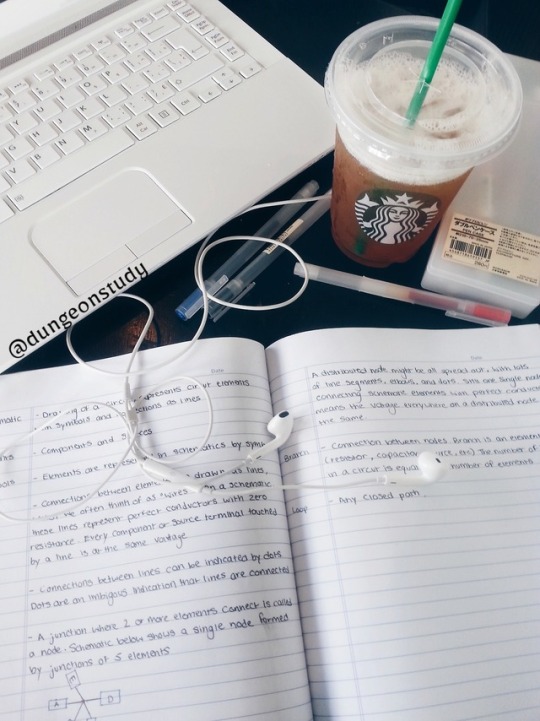

19/07/17 (July 19th, 2017)
Wrote notes for hours at Starbucks ☕️
Tried to catch up with my summer studies
Practiced writing Russian ✒️
[Listening to: Get Some by Lykke Li]
4K notes
·
View notes



